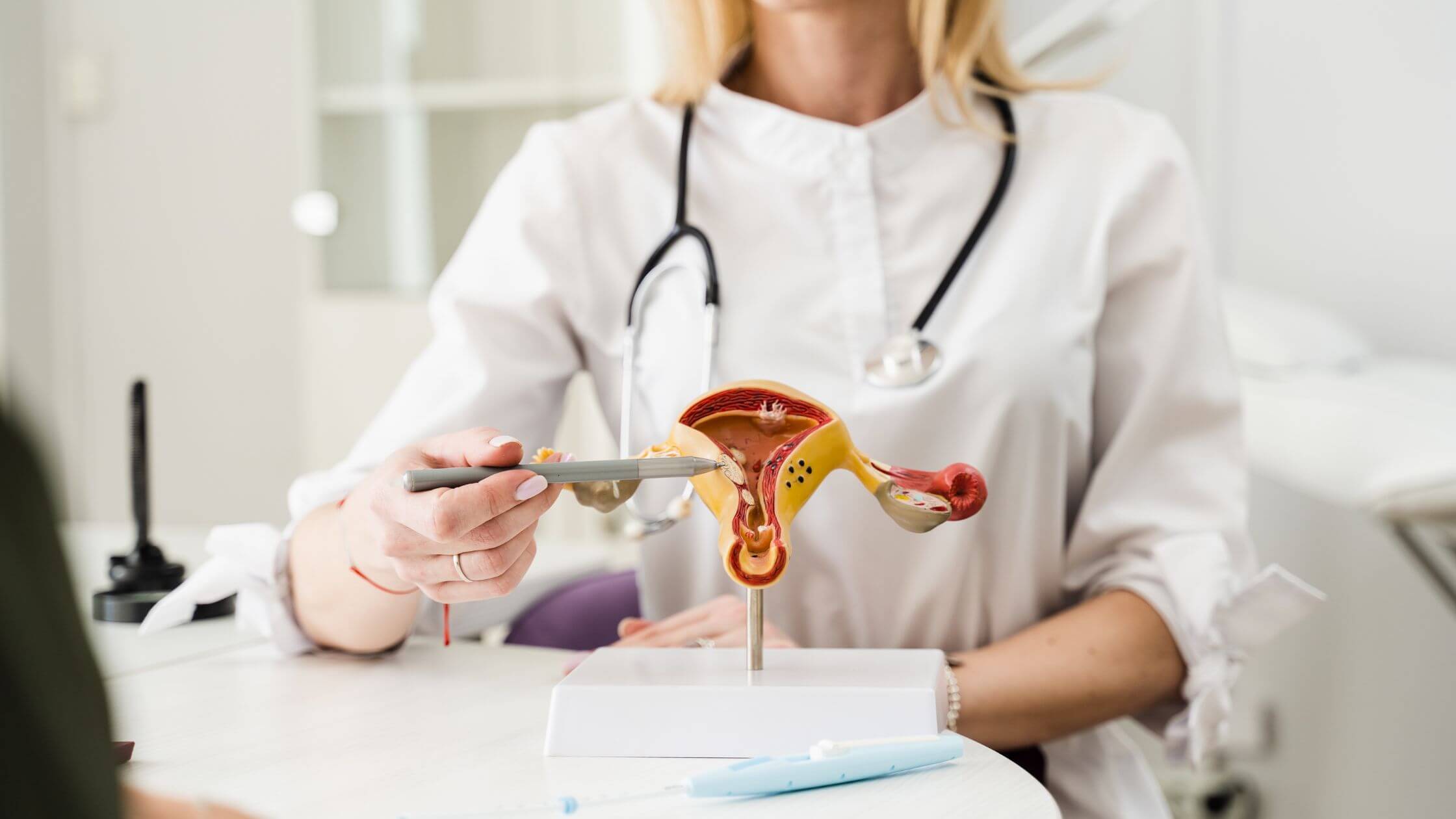PCOS is the most common hormonal disorder among women of reproductive age. Its incidence is rising each year, and the challenge lies in its chronic nature and diverse symptoms, which often lead to misdiagnosis. Many women also experience symptoms of PCOS after pregnancy, complicating their postpartum health.
What is PCOS?
Polycystic Ovarian Syndrome (PCOS) is an endocrine disorder diagnosed when at least two of the following three features are present:
- Irregular Periods / Menstrual abnormalities
- Excessive production of male hormones (Androgens)
- Polycystic ovaries (Enlarged ovaries with many fluid-filled sacs containing immature eggs)
PCOS After Pregnancy
PCOS is one of the leading causes of infertility and is often diagnosed when a patient struggles to conceive. Women who might have overlooked their symptoms earlier tend to take PCOS more seriously during this stage and seek treatment. After successfully conceiving, there is an increasing tendency to neglect symptoms once again. But pregnancy with PCOS needs to be monitored carefully for any complications related to the condition. PCOS can affect breast milk supply and intensify postpartum hormonal fluctuations. Thus, it’s important to manage PCOS even after delivery.
Will PCOS Go Away After Pregnancy?
Many believe that PCOS improves or is cured after pregnancy. Infertility is not the only complication associated with PCOS, unlike the common belief. PCOS is a chronic condition with lifelong implications, requiring management even after childbirth. Thus pregnancy is not a cure for PCOS.
How Symptoms of PCOS May Change Post-Pregnancy
While there is a chance that PCOS symptoms may improve or become dormant after pregnancy, this does not mean that PCOS disappears entirely. Cases have been reported where PCOS symptoms improved after the first pregnancy, with periods becoming regular and natural conception of subsequent pregnancies. However, this should not be assumed for everyone. Lifestyle monitoring can help maintain this relief, but symptoms may worsen in some women months or years after delivery. This is due to hormonal fluctuations during pregnancy and breastfeeding, which might temporarily reduce symptoms. Once hormonal levels stabilize, symptoms can relapse. Neglecting to manage PCOS at this stage may lead to worsening symptoms. After pregnancy, the focus should be on monitoring weight, tracking blood sugar levels and blood pressure, and managing stress.
Diagnosis of PCOS After Pregnancy
Recently, many women have been diagnosed with PCOS or started treatment months or years after delivery. This could be due to lifestyle changes, weight gain, stress or post-delivery hormonal imbalances, particularly in individuals with a genetic predisposition, making PCOS symptoms more apparent. Many of these women had been diagnosed with gestational diabetes, with PCOS or diabetes running in their families. Thus, it is possible to develop or discover PCOS after delivery. However, more studies and research are needed on the topic, including the triggers, and statistics.
Symptoms of PCOS
Common symptoms of PCOS include:
- Irregular periods
- Acne
- Obesity (especially weight gain around the belly)
- Skin tags
- Hyperpigmentation (especially around the neck)
- Excessive hair loss
- Fatigue
- Sleep disturbances
- Hirsutism (abnormal hair growth on the face and body)
Ayurvedic Management of PCOS
Ayurvedic treatments for PCOS focus on Samshodhana for srotho avarodha, Ama pachana, nidana parivarjana, and dosha vaisamya chikitsa according to each individual’s prakruthi. These treatments involve a combination of Ayurvedic herbs, lifestyle modifications, diet, and therapeutic procedures.
Ayurvedic Herbs for PCOS
Herbal remedies are often recommended by registered Ayurvedic physicians based on an individual’s body constitution (prakruthi) and symptoms. These herbs can provide significant benefits in managing PCOS by reducing inflammation, improving insulin resistance, and aiding weight management. Some beneficial herbs include:
- Triphala
- Punarnava
- Kanchanara
- Guduchi
- Ashwagandha
- Shatavari
Therapeutic Procedures for PCOS
Various therapeutic procedures can be beneficial and are planned according to individual needs. These treatments primarily focus on detoxifying the body, reducing stress, decreasing body fat, and balancing hormones. Depending on the individual, treatments may include:
- Virechana
- Abhyanga
- Udwarthana
- Swedana
- Uttarabasthi
- Nasya
Lifestyle Modification
Ayurveda emphasizes strict lifestyle modifications for managing PCOS, which can be categorized as follows:
Weight Monitoring
Weight monitoring is important for managing PCOS. Tracking Body Mass Index (BMI) is an essential part of this process. While PCOS can occur in women of normal weight (lean PCOS), many women with PCOS struggle with obesity. Effective weight management has shown significant improvements in PCOS symptoms. Weight gain in PCOS can result from hormonal imbalances, including insulin resistance, a sedentary lifestyle, lack of physical activity, or an improper diet. Proper weight monitoring helps identify the causes of weight gain and implement strategies to address them, aiding in better management of PCOS.
Regular Exercise
Maintaining an active lifestyle is important for managing PCOS or reducing the risk of developing it. Engaging in 30 to 45 minutes of exercise daily can significantly benefit those with PCOS. Make physical activity a consistent part of your routine. Regular exercise helps improve insulin resistance, hormonal imbalance, and obesity, reduces cardiovascular stress, and lowers the likelihood of developing diabetes, mental health issues, and other complications.
Adequate Sleep
In Ayurveda, sleep is considered one of the three basic pillars of health. Following Dinacharya, Ayurvedic self-care routines, which include waking up early and going to bed at a consistent time, is recommended. The benefits of sound sleep are substantial, including improved physical and mental health, helping you stay motivated throughout the day, and increased productivity. These factors can positively influence hormonal balance and ovulatory function.
Stress Management
Stress can arise from hormonal issues and external factors such as concerns about physical appearance, job stress, or household responsibilities. Adopt techniques like self-care routines, mindfulness, meditation, or yoga into your daily life. Ayurvedic practices also recommend remedies such as oil massages with herbal oils and head massages to help reduce stress.
Ayurvedic Diet for PCOS
Ahara or food is one of the three fundamental pillars of health in Ayurveda. Patyahara or dietary regulation is considered a form of medicine. Lifelong dietary modifications are essential for managing PCOS.
Diet to Follow
- Whole grains like ragi, whole oats, and brown rice
- Fiber-rich, low glycemic index fruits and vegetables
- Increased protein intake, especially lean proteins
- Staying hydrated: Drink plenty of water based on your body weight
- Green leafy vegetables like spinach
- Include Ayurvedic spices like cinnamon, ginger, turmeric, and cumin, which have anti-inflammatory properties and can help with insulin resistance
Follow Ayurvedic dietary habits, such as eating at least 3 hours before sleeping, not eating too late after sunset, eating at a moderate speed, and chewing food properly.
Foods to Avoid
- Tea and coffee: These can increase inflammation and exacerbate symptoms. Substitute with herbal teas.
- Dairy products: Avoid milk and other dairy products as they can influence insulin resistance.
- Refined sugars: Avoid sugar in any form to control blood sugar levels and insulin resistance.
- Saturated and trans fats: Avoid these unhealthy fats as they can worsen inflammation and contribute to weight gain.
- Processed foods: These are often high in additives, preservatives, unhealthy fats, or oils and should be avoided.
- Salt: Limit salt intake to reduce water retention and inflammation.
- Carbonated drinks, alcohol, and smoking: These can contribute to inflammation and worsen hormonal imbalances.
Reflections from Mindful Portrait

Managing PCOS requires patience and persistence, as treatment outcomes and symptoms can vary from person to person. Continue with lifestyle modifications, a balanced diet, and regular exercise, and monitor your weight, menstrual cycles, and other symptoms. It’s easy to ignore PCOS symptoms after pregnancy, but neglecting them can lead to serious risks, such as cardiovascular issues, mental health disorders, and ovarian cancer.
Rather than stressing out, consider a diagnosis or symptoms of PCOS after pregnancy as a reminder to prioritize your self-care and health. Keep up your efforts and take charge of your health—you have the strength and ability to effectively manage PCOS and improve your well-being.

